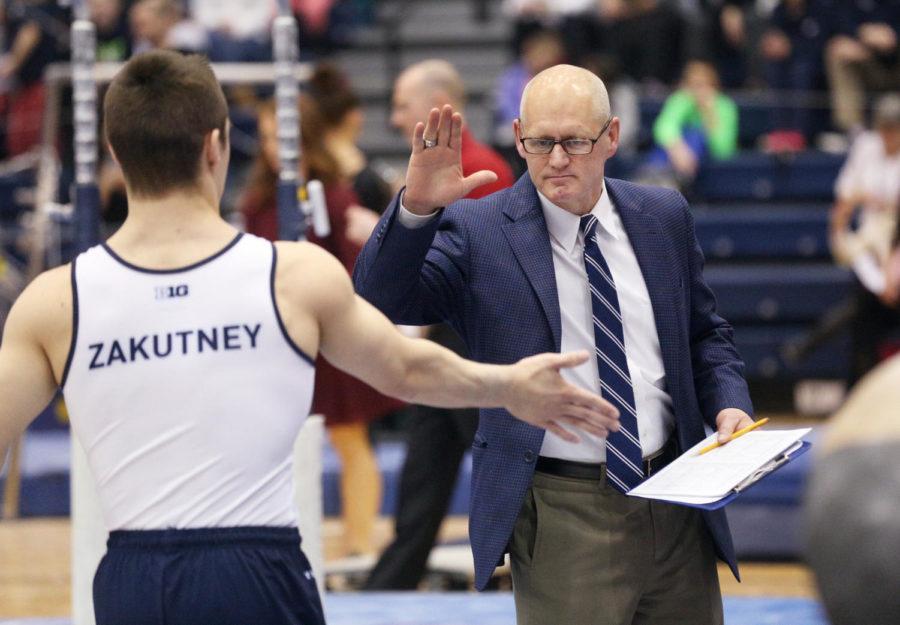The Summer Olympics: The ultimate goal for men’s gymnastics
April 18, 2018
Editor’s Note: This is part three of a four-part series on the disappearance of men’s gymnastics in the United States. The first part of the series was published on April 17, 2018, and can be found here. The second part of the series was published on April 18, 2018, and can be found here.
Seventeen days.
Most college athletes have a dream to make it professionally. Whether that’s a football player thinking about the NFL or a basketball player thinking about the NBA or WNBA, there’s always the opportunity and pursuit.
For gymnastics, there’s no such thing except for 17 days every four years.
The Summer Olympics.
That’s where the fame and the glory becomes a reality. You get the chance to step in front of millions of viewers and represent the United States, but for only 17 days.
The NFL, NBA, WNBA, MLB and NHL all have seasons and those seasons come and go every year, not every four years.
The majority of male gymnasts grow up and usually start the sport at the young age of 4 or 5 years old. After 13 or 14 years of 20 to 30 hours of practice each week, there’s the possibility of receiving a college scholarship.
Then, the gymnast works hard during their college career translating into successful junior and senior years that lead the gymnast to the qualification of the U.S. Senior National Team. It’s not just a job, it’s an honor to represent the United States.
Then, the gymnast prepares for hours and hours each day and each week to prepare them for the Summer Olympics. After all of that, these gymnasts get 17 days to shine.
“Every male and female gymnast is fighting for that shot to represent their country,” said Penn State head coach Randy Jepson.
The ability to compete on the U.S. Senior National Team is an honor and privilege. Out of the 421 gymnasts in college, only 12 make it onto the U.S. Senior National Team. And looking beyond college, there are thousands of high school students that are competing for those 12 spots as well.
The likelihood of making the Olympic team is very small, but that small chance is what drives these men to work on Friday nights and Saturdays as well as the entire week for that dream.
“It’s a small chance, but that’s been the dream since participating in my first summer camp,” said Ames native and gymnast Ben Eyles on making the U.S. Senior National Team. “That dream is always in the back of my head no matter what I’m doing in the gym.”
Eyles planned like most gymnasts in college. He’s planning when he’s getting out of college and how much time he has until the next Olympic Games.
For example, if a gymnast was to graduate from college this year, in 2018, he would have two years before the next game.
In Eyles’ case, he intends to graduate in 2022 with his bachelor’s degree. He plans to stay an extra year to finish up school and possibly work on a masters. Depending on how his career goes at Minnesota, he would try out for the U.S. Senior National Team and work hard for the opportunity to compete in the 2024 Olympic Games.
That’s a doable goal for Eyles, so he’s crossed out 2020 Tokyo and replaced it with 2024 Paris in his notebook. His main goal is to make the U.S. Senior National Team, which could lead to the possibility of representing the United States in the 2024 Paris Olympics.
Even though the Olympic Games is one of the biggest competitions in the world, Jepson said it’s not the only world competition. During the off years of the Olympics like 2018, 2019 and 2021, the U.S. Senior National Team of male gymnasts compete in the World Championships.
“The Olympics is the most popular world competition and most people look forward to the next four years to see the next round of talent,” Eyles said. “It’s hard, especially for gymnasts, to stay in shape for another four years to come back again. Usually for gymnastics, you get one year to shine on the world stage.”
The ability to keep this dream alive for every male gymnast in the United States, there needs to be a new direction or a new philosophy since the number of male gymnasts is dropping year by year.
















